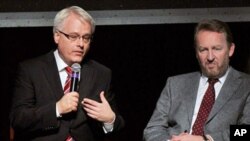The Dayton Peace Accord that ended the Bosnian War in the former Yugoslavia was reached during the Clinton administration in November 1995 and signed the following month in Paris. President Bill Clinton Wednesday hosted a panel discussion in New York City for a belated 15th anniversary examination of what the accord meant at the time and its significance for the future.
Bosnia in the early 1990s saw the worst fighting in Europe since World War II. Serbian aggression against the Balkan republic claimed 250,000 lives and displaced 2 million people. European countries initially stood by as the slaughter unfolded. Former Secretary of State James Baker summed up U.S. public opinion and congressional opposition to American intervention when he said the United States "doesn’t have a dog in this hunt." President Clinton thought otherwise.
"Number one, because in the aftermath of the Cold War, the United States had to redefine its relationship with Europe and with NATO. And that all of our pretentions that the crumbling of communism would lead to a great burst of enlightened democracy, freedom, prosperity and security would have looked like a fraud," Clinton said.
Clinton made his remarks Wednesday during a retrospective on the Dayton Accord at New York University. Participants included former U.S. Secretary of State Madeleine Albright, retired General Wesley Clark and European Union High Representative Catherine Ashton. They recalled wartime atrocities, and pressure against Serbia to come to the peace table. It consisted of economic sanctions, NATO bombing missions against Serbian forces, and weapons delivered to unarmed Bosnians.
Former U.S. Ambassador to Croatia Peter Galbraith described what the alternative to peace might have been. "We might be discussing here in 2011 year 20 of the Bosnia-Croatia wars. We might have had Croatia as a Cyprus, in which Serbs occupy part of the country in a state of permanent hostility. Bosnia, as a source of ongoing conflict, no doubt a hotbed for terrorism," he said.
The panelists conceded that the Dayton Accord has not been perfect. But it has kept the peace.
Noticeably absent from the New York event was any Serbian representative.
The Presidents of Bosnia and Croatia said problems of peace include unemployment, corruption, ineffective judiciaries, bloated government bureaucracies and lack of investment. Moderator and American television journalist Christiane Amanpour challenged the two leaders to cooperate on economic development, prompting them to shake hands.
Bosnian President Bakir Izetbegovic recognized the reconciliation efforts by his Croatian counterpart, Ivo Josipovic.
"In the Balkans, it’s easier to follow the same mantra - everybody is guilty but your side. President Josipovic was ready to confess, not only to accuse. So he’s the one who opened a new dimension in that sense. And then, it will produce a better atmosphere, it will attract investments," Izetbegovic stated.
In closing remarks, President Clinton said the Dayton Accord was the post-Cold War world’s first effort to prove that people can live in an environment in which all sides can win without another side losing. He expressed hope that this notion succeeds, adding that it still needs to be proven.
